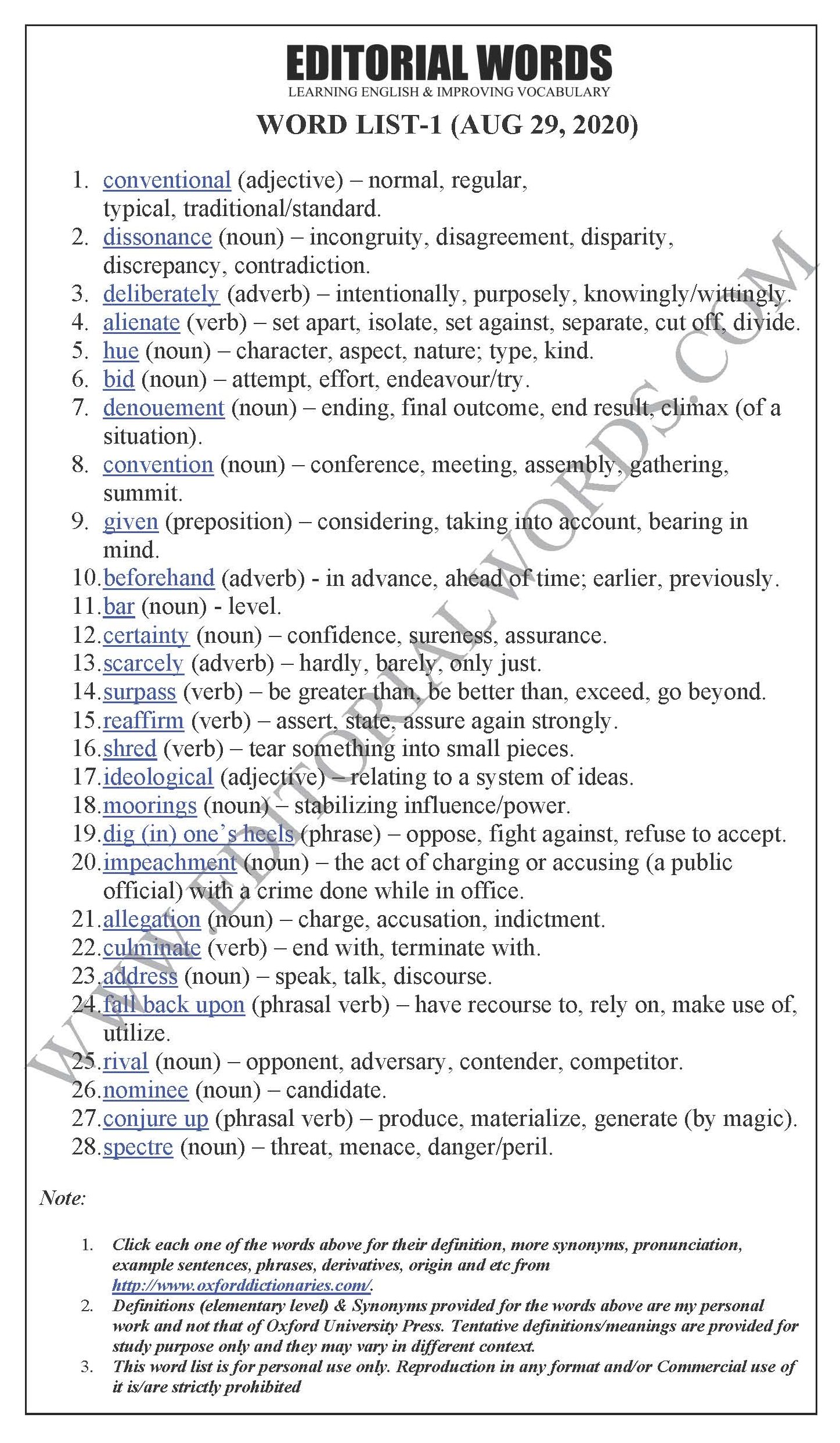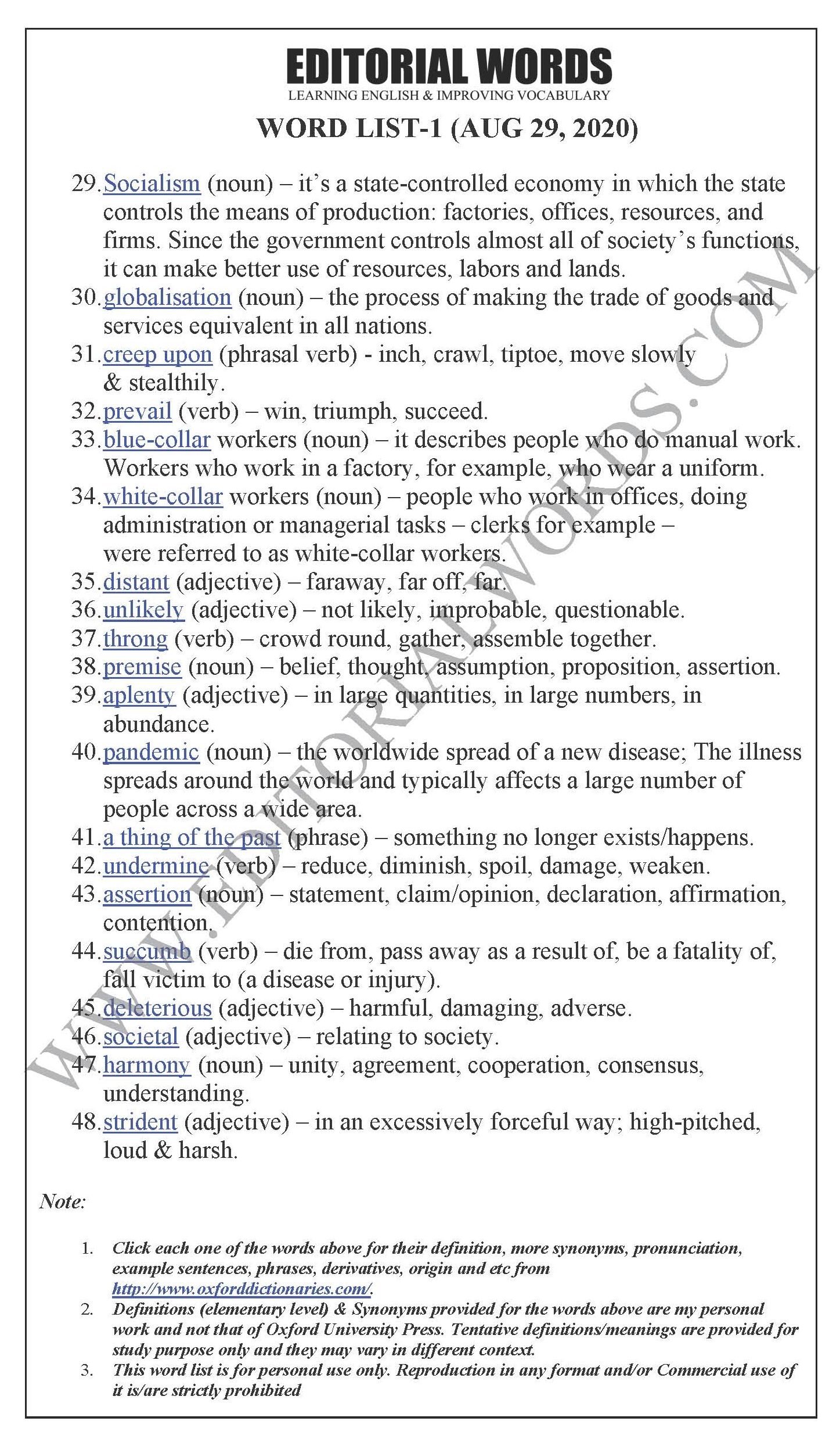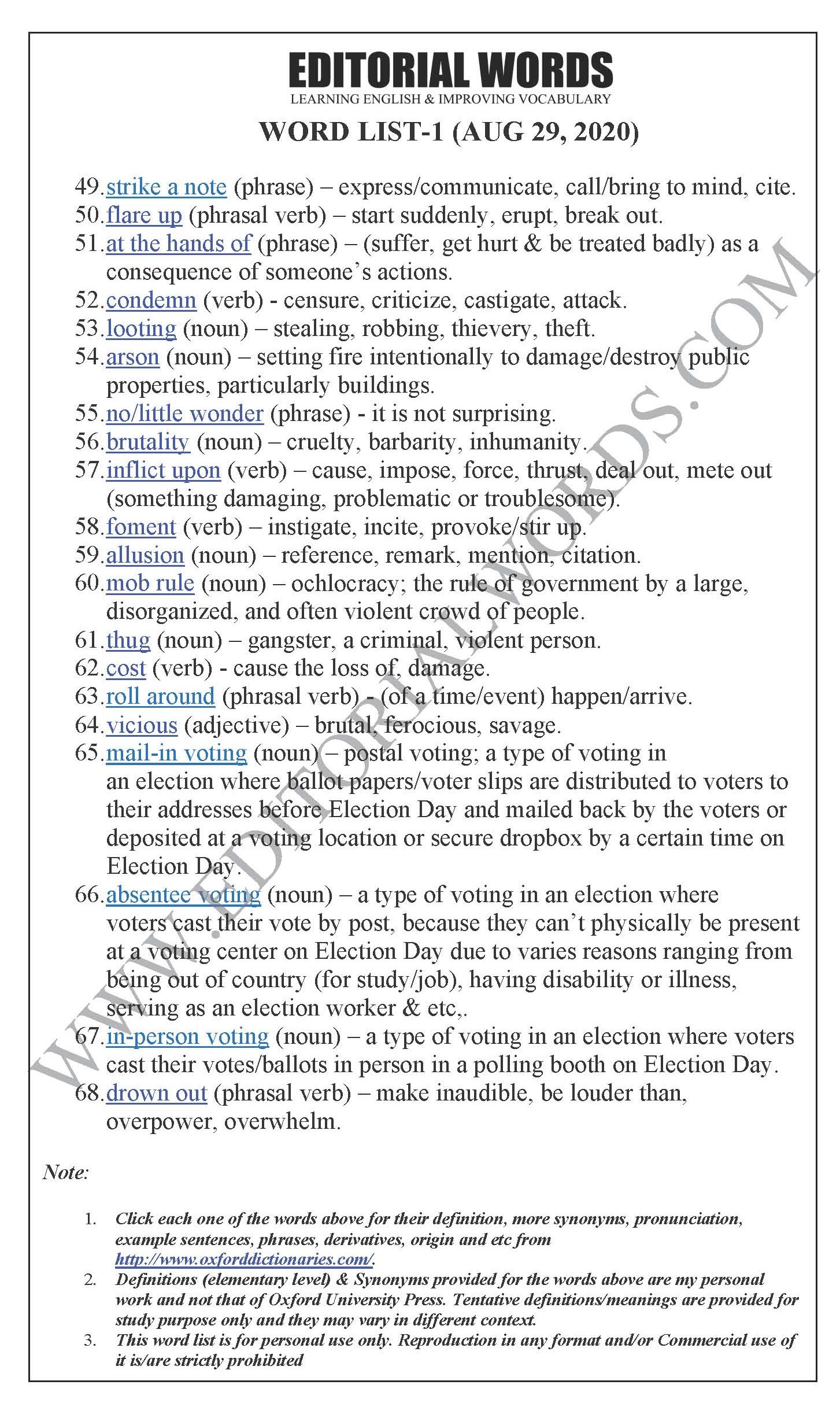The Hindu Editorial (Conventional dissonance) – Aug 29, 2020
There are few events in U.S. election politics that offer a more predictable denouement than the National Conventions of the two major parties,… For further reading, visit “The Hindu”. Below is today’s word list-1 for The Hindu Editorial (Conventional dissonance) – Aug 29, 2020.
To read this article, click here.
This preview is provided here with permission.
Courtesy: The Hindu
Today’s word list-1 for The Hindu Editorial (Conventional dissonance) – Aug 29, 2020:
- conventional (adjective) – normal, regular, typical, traditional/standard.
- dissonance (noun) – incongruity, disagreement, disparity, discrepancy, contradiction.
- deliberately (adverb) – intentionally, purposely, knowingly/wittingly.
- alienate (verb) – set apart, isolate, set against, separate, cut off, divide.
- hue (noun) – character, aspect, nature; type, kind.
- bid (noun) – attempt, effort, endeavour/try.
- denouement (noun) – ending, final outcome, end result, climax (of a situation).
- convention (noun) – conference, meeting, assembly, gathering, summit.
- given (preposition) – considering, taking into account, bearing in mind.
- beforehand (adverb) – in advance, ahead of time; earlier, previously.
- bar (noun) – level.
- certainty (noun) – confidence, sureness, assurance.
- scarcely (adverb) – hardly, barely, only just.
- surpass (verb) – be greater than, be better than, exceed, go beyond.
- reaffirm (verb) – assert, state, assure again strongly.
- shred (verb) – tear something into small pieces.
- ideological (adjective) – relating to a system of ideas.
- moorings (noun) – stabilizing influence/power.
- dig (in) one’s heels (phrase) – oppose, fight against, refuse to accept.
- impeachment (noun) – the act of charging or accusing (a public official) with a crime done while in office.
- allegation (noun) – charge, accusation, indictment.
- culminate (verb) – end with, terminate with.
- address (noun) – speak, talk, discourse.
- fall back upon (phrasal verb) – have recourse to, rely on, make use of, utilize.
- rival (noun) – opponent, adversary, contender, competitor.
- nominee (noun) – candidate.
- conjure up (phrasal verb) – produce, materialize, generate (by magic).
- spectre (noun) – threat, menace, danger/peril.
- Socialism (noun) – it’s a state-controlled economy in which the state controls the means of production: factories, offices, resources, and firms. Since the government controls almost all of society’s functions, it can make better use of resources, labors and lands.
- globalisation (noun) – the process of making the trade of goods and services equivalent in all nations (Courtesy: VOA Learning English).
- creep upon (phrasal verb) – inch, crawl, tiptoe, move slowly & stealthily.
- prevail (verb) – win, triumph, succeed.
- blue-collar workers (noun) – it describes people who do manual work. Workers who work in a factory, for example, who wear a uniform.
- white-collar workers (noun) – people who work in offices, doing administration or managerial tasks – clerks for example – were referred to as white-collar workers.
- distant (adjective) – faraway, far off, far.
- unlikely (adjective) – not likely, improbable, questionable.
- throng (verb) – crowd round, gather, assemble together.
- premise (noun) – belief, thought, assumption, proposition, assertion.
- aplenty (adjective) – in large quantities, in large numbers, in abundance.
- pandemic (noun) – the worldwide spread of a new disease; The illness spreads around the world and typically affects a large number of people across a wide area.
- a thing of the past (phrase) – something no longer exists/happens.
- undermine (verb) – reduce, diminish, spoil, damage, weaken.
- assertion (noun) – statement, claim/opinion, declaration, affirmation, contention.
- succumb (verb) – die from, pass away as a result of, be a fatality of, fall victim to (a disease or injury).
- deleterious (adjective) – harmful, damaging, adverse.
- societal (adjective) – relating to society.
- harmony (noun) – unity, agreement, cooperation, consensus, understanding.
- strident (adjective) – in an excessively forceful way; high-pitched, loud & harsh.
- strike a note (phrase) – express/communicate, call/bring to mind, cite.
- flare up (phrasal verb) – start suddenly, erupt, break out.
- at the hands of (phrase) – (suffer, get hurt & be treated badly) as a consequence of someone’s actions.
- condemn (verb) – censure, criticize, castigate, attack.
- looting (noun) – stealing, robbing, thievery, theft.
- arson (noun) – setting fire intentionally to damage/destroy public properties, particularly buildings.
- no/little wonder (phrase) – it is not surprising.
- brutality (noun) – cruelty, barbarity, inhumanity.
- inflict upon (verb) – cause, impose, force, thrust, deal out, mete out (something damaging, problematic or troublesome).
- foment (verb) – instigate, incite, provoke/stir up.
- allusion (noun) – reference, remark, mention, citation.
- mob rule (noun) – ochlocracy; the rule of government by a large, disorganized, and often violent crowd of people.
- thug (noun) – gangster, a criminal, violent person.
- cost (verb) – cause the loss of, damage.
- roll around (phrasal verb) – (of a time/event) happen/arrive.
- vicious (adjective) – brutal, ferocious, savage.
- mail-in voting (noun) – postal voting; a type of voting in an election where ballot papers/voter slips are distributed to voters to their addresses before Election Day and mailed back by the voters or deposited at a voting location or secure dropbox by a certain time on Election Day.
- absentee voting (noun) – a type of voting in an election where voters cast their vote by post, because they can’t physically be present at a voting center on Election Day due to varies reasons ranging from being out of country (for study/job), having disability or illness, serving as an election worker & etc,.
- in-person voting (noun) – a type of voting in an election where voters cast their votes/ballots in person in a polling booth on Election Day.
- drown out (phrasal verb) – make inaudible, be louder than, overpower, overwhelm.
Note:
1. Click each one of the words above for their definition, more synonyms, pronunciation, example sentences, phrases, derivatives, origin and etc from http://www.oxforddictionaries.com/.
2. Definitions (elementary level) & Synonyms provided for the words above are my personal work and not that of Oxford University Press. Tentative definitions/meanings are provided for study purpose only and they may vary in different context.
3. This word list is for personal use only. Reproduction in any format and/or Commercial use of it is/are strictly prohibited.
Today’s word list-1 The Hindu Editorial (Conventional dissonance) – Aug 29, 2020:



“Phrasal Verbs” We Learnt Last Week
“Idioms & Phrases” We Learnt Last Week
“Important Definitions” We Learnt Last Week
Recent Word Lists For The Hindu Editorial Articles

Be the first to comment